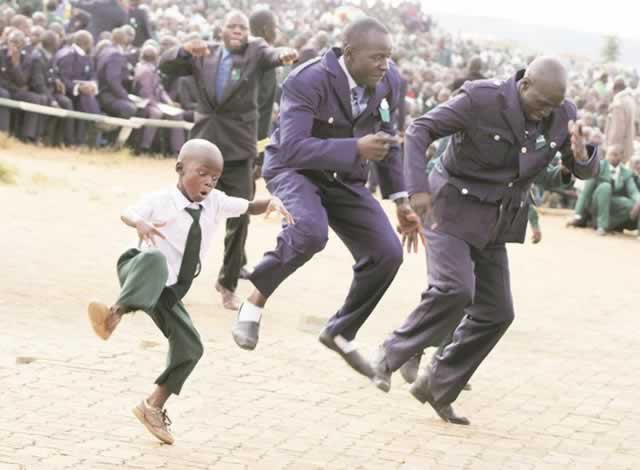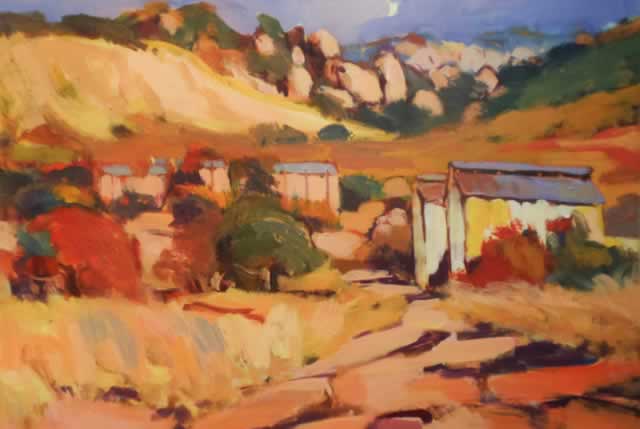Christianity and return of happiness, laughter


Dancing as if possessed. . .Today’s Christians have no qualms with the way they celebrate their love for Jesus Christ, just as it used to be in the village of yore
Sekai Nzenza on Wednesday
It was at that time, when I became a born again Christian during my youth, that I stopped laughing loudly the way village girls used to do . . . At night, I also stopped going to the moonlight village dances. . .
A couple of weeks ago, youths from a church blocked the whole street in Mt Pleasant to sing and praise the Lord with loud speakers and tambourines.
They held a banner with Christian verses and a picture of Jesus on the cross.
These young people looked happy.
They were doing all kinds of movements including pelvic thrusts. Their dancing rhythms varied from kwaito to kwasa-kwasa and ndombolo. The guys wore white shirts, red ties, pointy black shoes, big belt buckles and nice haircuts.
Dancing with vigorous energy, they waved and jumped up and down as if possessed. Alongside them were smartly dressed girls wearing wavy weaves, wigs, long plaits and others had short hair.
I parked by the road side to give them all the space on the road that they wanted.
I also wanted to take pictures.
Since when did Christianity allow such lewd dances and such laughter among church people? I recalled a time back when such laughter and singing was common among youths and adults.
But that was back in the village, when we knew little about the church.
In those days, if you travelled close to the river near us, you would know where the women and girls were bathing by the sound of their laughter. We used to laugh, dance, sing, swim and learn many secrets of womanhood. My grandmother, Mbuya VaMandirowesa and other older women also used to come down to the river especially during the dry season when all the harvest was over. At the river, Mbuya was relaxed, warm and not even authoritative. She ordered us to scrub and massage her back with a stone. When Mbuya was all scrubbed and clean, she put peanut oil all over her body and told us funny stories of ghosts, love and marriage.
We listened and at times we danced to the songs in the stories. The women from our village compound and from across the river bathed and paraded themselves naked. They endlessly laughed and teased each other about the size of their bottoms and legs. This was a women only bathing place where nothing was taboo. We swam in the river while our clothes hung on the tree branches to dry. Then we young girls played a game called garwe herisadza; crocodile here is your sadza. One person was the crocodile and everyone else teased him pretending to give him sadza.
The crocodile danced and sang ‘swederera’, get closer, until he pounced on one of us and ran away to eat her. We learnt to swim that way, running away from the “crocodile.” Then we sang and danced naked on the rocks, swam, rolled in the river sand and jumped in the water many times. Often, we went home feeling happy and exhausted.
There were many occasions to express joy and laugh. Some jokes would make us laugh until our ribs ached. In the village compound there was a man called Zungunde who was known for dancing and making people laugh. Sometimes when we saw Zungunde coming, my mother and all the younger women who were married into our large paternal family would tell us to leave immediately in case we hear Zungunde’s jokes.
In no time at all, Zungunde engaged in sexual banter that made them laugh so much. He was the family nephew or muzukuru and therefore allowed to say what he liked to the wives of his uncles.
During a village beer party, we waited on the outskirts of the village compound watching the elders; men and women drink beer, sing, dance, play the drum and mbira.
Echoes of laughter could be heard through the hills when they got really happy. In those days, the women who were past child bearing age drank and danced alongside men. One day, we heard the women asking Zungunde to do his dance called, kwave kutamba kwava Zungunde, meaning, this is the way Zungunde dances. In the golden sunset, we saw Zungunde gather medium size and small stones. He placed them in a wrap-around cloth and tied the cloth around his waist, with the stones hung quite loosely on his front, like a big pouch of something.
He then started dancing slowly and swinging his bag of stones from one side to the other like a pendulum. Then he lurched his whole body backwards and forwards towards the women, dancing and singing, “Kwave kutamba kwava Zungunde. Ndikuza. . . ndikuzache. Ndikuza. . .” There were hysterics of laughter from both men and women. What Zungunde said was not meant for the ears of the young. But we heard it all and held our stifled laughs. Later on, we would make stone pouches with the bottom part of our dresses and imitate Zungunde’s dance, gyrating the waists and doing pelvic thrusts like he did.
Those who went to Salisbury (Harare) came back to tell us that there were churches for white people only where the singing was slow and soft.
A lady played a piano in the corner. After the service, the European people greeted each other with kisses on the cheeks and there was no loud laughter. Then they quietly got into their cars and went home.
We listened to such stories of ‘civilisation’ where there was little or no laughter or expressions of emotions. By the time I went to the Methodist boarding school, I already had a picture of what kind of Christian I wanted to be. After one year at boarding school, I accepted Jesus Christ as my personal Saviour.
It was at that time, when I became a born again Christian during my youth, that I stopped laughing loudly the way village girls used to do. One day, during school holidays, I came back to the village, carrying a new Bible, given to me by Miss Hutchinson, a very kind missionary at the school. When handing over the Bible to me she quoted, 2 Corinthians 5:17 in the New King James Version. I recall the verse very well, even now. It said, “Therefore, if anyone is in Christ, he is a new creation; old things have passed away; behold, all things have become new.”
At night, I also stopped going to the moonlight village dances as well, because, that too was primitive and would lead to sinful practices. My sisters, who did not convert to Christianity the way I did, managed to create a balance between boarding school knowledge and village lifestyle. They danced in the moonlight and fell in love with village boys.
Gradually, I adopted the tone of serious and polite etiquette that came with Christianity and civilised English manners.
There was no room for real laughter or dancing anymore. I only wanted the life that would lead to heaven. Since the days of the river dances and Zungunde, we are gradually forgetting how to laugh from the belly, the way we used to do.
Our changes in lifestyle and the problems of translating jokes from English to Shona bring less laughter to our lungs.
Most missionaries have gone. They planted the seeds of Christianity within us before they left. Various forms of toned down religious practices are taking over funerals, birthday parties, baby showers, kitchen parties and weddings. Sometimes I see Christians who remind me of myself in the old days. They are becoming too religious to laugh, to be happy and to tell good or bad jokes.
But some churches, like the one with the youths dancing in the streets, are seeking more joy and happiness in the way they worship. They are infusing the old village and modern rhythms of dance into the church. The wild dances I saw on the streets of Mt Pleasant could leave Michael Jackson for dead. If Zungunde the village comedian was still around, he would not hesitate to join them, even though he might have never heard of Jesus Christ ·
Dr Sekai Nzenza is an independent writer and cultural critic.









Comments